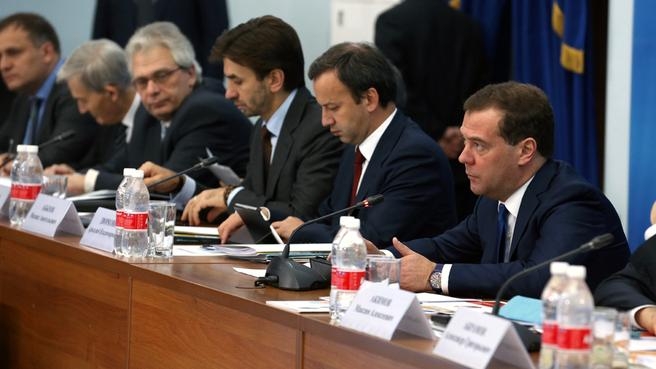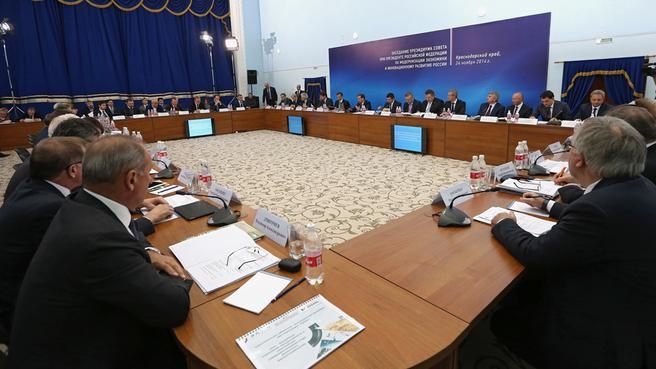Meeting of the presidium of the presidential council on economic modernisation and innovation-based development in Russia, village of Zhelezny, Krasnodar Region.
Opening remarks by Dmitry Medvedev:
Recently, we have held many meetings on promoting
agriculture, but today's meeting of the presidium of the presidential council
on economic modernisation is devoted to innovation-based development of
agriculture. We will discuss the development of modern agricultural production
processes, what is standing in their way and what is helping, and how we should
go about pursuing a state policy in this area in the coming years.
As little as 10 years ago, we wouldn’t have been
discussing the modernisation of agriculture, because it wasn’t part of our
agenda. Today, we have many instances of successful innovation-based
development of the industry and introduction of our own production processes.
In fact, modernisation is underway of what is perhaps one of the most
conservative industries, which is indicative of the fact that agriculture is
developing at a good pace, and we can see the results of this work.
We have repeatedly said that Russia can at least feed
itself and, given the vast reserves of water, arable land and other resources,
it can become a major supplier of agricultural products. Thanks to a targeted
state policy in recent years, we have achieved good results. This year's grain
harvest will amount to about 104 million tonnes. In vegetable production, we
have already reached or even surpassed the benchmarks outlined in the food
security doctrine. We have achieved fairly good results in poultry and pork
production. Today, we toured a good dairy farm, although much remains to be
done in this industry. Unfortunately, such enterprises are not as profitable as
we’d like.
Building up our import replacement capabilities in the
segments that were freed up by the countries, the governments of which opted
for political escalation at the expense of their own producers, is one of our most
pressing issues. Russian producers have a special responsibility to ensure
adequate supplies of appropriate quality, which has a lot to do with the use of
modern technology.
If we look at the leading companies in the world and
Russia, we’ll see highly automated production sites which use the latest
scientific designs. The significant progress of these countries is well known.
Significant progress has been made in the area of
so-called precision farming, which combines geo navigation systems, satellite maps
and software to determine the necessary amount of fertilisers. This makes it
possible to reach a whole new level of productivity. As a matter of fact, we
have already reached it.
Genome analysis technology, which is used in animal and plant breeding, as well as in various quality control systems, has made good progress.
Modern agriculture is a resource base not only for the food market, but also for power generation and fuel production. However, we should not forget about the environmental and social consequences of such an approach to agriculture.
At a meeting of the council presidium in Belgorod in February, we discussed biotechnology, which is increasingly used to protect plants and stimulate their growth. In livestock production, it is used for the production of feed additives and veterinary drugs.
Of course, this is only a general outline of the technical progress that has been made. Today, innovations occur in virtually all segments of agriculture: new plant varieties, new types of fertilisers, new livestock raising methods, and new ways of product processing and recycling are being created. The overall objective of the government, businesses, academia, development institutions and agricultural universities is to create an environment where all these achievements would be actively used for the benefit of our agricultural production, and improve Russia’s competitive edge. We are allocating ample resources to this end. The Ministry of Agriculture and the Ministry of Education provide funding to applied research totalling about 1 billion roubles. Almost 1,500 modernisation and innovation projects worth about 60 billion roubles have been sponsored through development institutions since 2007.
Dmitry Medvedev: "Today, innovations occur in virtually all segments of agriculture: new plant varieties, new types of fertilisers, new livestock raising methods, and new ways of product processing and recycling are being created. The overall objective of the government, businesses, academia, development institutions and agricultural universities is to create an environment where all these achievements would be actively used for the benefit of our agricultural production, and improve Russia’s competitive edge. We are allocating ample resources to this end."
In addition to direct financing of such projects, it is likewise important to improve the regulatory framework of this industry. It should encourage the use of the most advanced agricultural processes. The innovative component should also be strengthened in sectoral policy documents. Investment in research should go along with effective implementation of its results, for which we need to establish closer ties between agricultural universities and industry-leading research centres and advanced production companies, and tie in the choice of priority areas of agribusiness with the training programmes at higher education institutions and research centres.
Dmitry Medvedev: "The Ministry of Agriculture and the Ministry of Education provide funding to applied research totalling about 1 billion roubles. Almost 1,500 modernisation and innovation projects worth about 60 billion roubles have been sponsored through development institutions since 2007."
It is also important to support small innovation-based companies and experimental farms. They should be provided with improved and simplified procedures for land allocation for temporary use while maintaining oversight over the intended use of the land.
Of course, it’s imperative that lists be generated of the best available production processes, including advanced domestic designs that may be recommended for use throughout the country. Their use can serve as a criterion for providing targeted support to the most promising projects and farms.
The goal that we have already discussed in the context of the so-called sanctions has to do with the development of domestic breeding centres in crop and livestock production. I have issued a corresponding instruction to the Research Organisations Agency and the Ministry of Agriculture. I hope we will hear more detailed proposals today.
Let's discuss these and other issues of innovation-based development of our agro-industrial complex.
<…>













